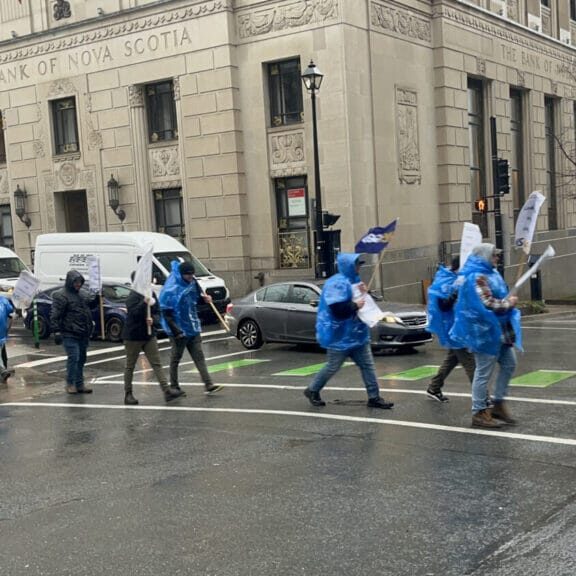
Correctional officers rally for higher wages amid challenging working conditions
Assaults at the Burnside correctional facility increased 125 per cent since 2021
Despite the cold winds and pouring rain, over 40 correctional officers from facilities across Nova Scotia protested in front of the Justice Department for better pay on Thursday, Dec. 5 2024.
“They’re the lowest paid in the country and continue to be dealing with very high risk offenders in custody,” says Hugh Gillis, a correctional worker and the first vice-president of the Nova Scotia Government Employees Union, which represents over 400 correctional officers.
According to Gillis, the salary for correctional officers in Nova Scotia tops out at $69,000, while officers continue to deal with high-stress physical incidents and people in custody with severe mental health problems. This is leading to a “revolving door” as the government attempts to hire new officers.
“When you as someone in the public are looking to get into corrections … would you choose to go to a province that is the lowest paid in the country? Who in their right mind would choose that as a job if you had your choice?” says Andrea Hancock, a veteran officer at the Central Nova Scotia Correctional Facility, known locally as Burnside.
Assaults at the Burnside facility increased by 125 per cent since 2021. According to a freedom of information request to the Justice Department, there were 112 offender on offender incidents and 36 offender on staff incidents from January to August. Six resulted in hospitalizations.
“I think you’ll continue to see staff assaults if you have more inexperienced people working with less experienced people and less staff. You’re just outnumbered and outmaneuvered,” says Gillis.
In order to help those in custody, Gillis says the government must be willing to work towards fixing the retention and recruitment issues.
Hancock echoed the statement, “We want to be respected, and money shows a sign of respect. But our goal overall is to meet the needs of the people in our custody. It’s that simple.”
As a result of understaffing, there have been mass lockdowns at Burnside, since there is not enough staff to safely let those in custody out.
Emma Halpern, the co-director of nonprofit law firm PATH Legal and executive director of the Elizabeth Fry Society of Mainland Nova Scotia, called Burnside a “powder keg” when asked about the rising assault statistics.
“These are fixable problems, but what we’re doing is we’re creating environments where violence is inevitable because we are locking people up and taking away their humanity,” says Halpern.
In March, PATH, alongside various advocacy groups across Nova Scotia, wrote four calls to action directed at the provincial government. This included demands for better healthcare and mental health programming, an end to the lockdowns and mandatory public inquiries into deaths in custody.
The government has not responded, according to Halpern.
Earlier this year, the Supreme Court of Nova Scotia ruled that lockdowns at Burnside on the basis of understaffing were “unlawful,” based on the experiences of Ryan Wilband and Durrell Diggs, who were in custody at Burnside awaiting trial.
Diggs was locked in his cell for over 21 hours a day for 38 days, followed by a 22 hour lockdown for another eight days out of his 51 days at the facility. Wilband experienced the same, locked in his cell for three days straight.
On December 10, the government of Nova Scotia appealed the Supreme Court ruling.
“I think that’s the part that is so heartbreaking, is that if we cared as a society, and if our government cared, we could properly resource and properly support folks to actually have proper access to healthcare and we would see less people die,” says Halpern.






